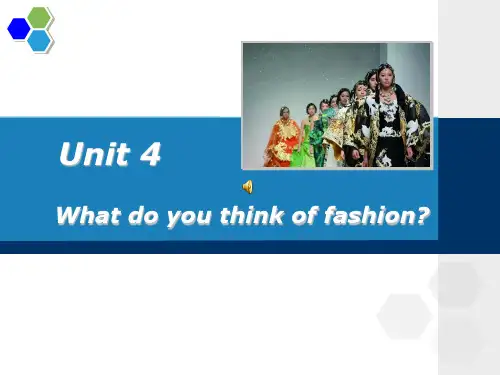外研社中职英语基础模块修订版PPT UNIT4
- 格式:ppt
- 大小:14.92 MB
- 文档页数:50
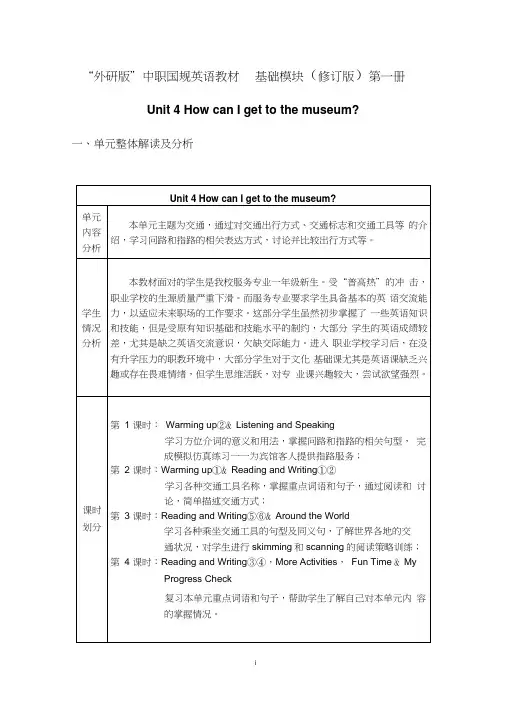
“外研版”中职国规英语教材基础模块(修订版)第一册Unit 4 How can I get to the museum?一、单元整体解读及分析、分课时教学设计第1课时Brai nstormi ng1.在屏幕上快速闪现我市一些标志 性建筑的照片、交通标志的照片及观察照片,小 组讨论并回头脑风暴, 激活课堂。
即将开幕的世界园艺博览会建筑物 的照片,请学生说出这些地点的名答相关问题。
熟悉的景物称,如:bank , post office ,library , 照片激发学shopping mall , No.1 Vocational 生兴趣。
复习 热身School , park , railway station ,bus station, subway, museum 等。
资源准备:事先拍好照片,做成PPT课件。
2.再次展示上述照片,同时出示单根据照片内复习单词,词,引导学生复习生活中常见地点容朗读单词。
为下面的听 的单词,同时共同元成Warming up说任务做好②。
准备。
1. Lead in g-i n展示本市博物馆的照片,创设情境:听并理解情创设情境导There is a dinosaur exhibition in the museum this Sun day. I want to visit it. But I d on ' t know the way, how can 1 get there? Who can help me?由情境 引入本课话题“ How can I get to the museum?境。
入新课。
2. Study aims屏幕展示本节课的学习目标。
了解学习目 明确学习任标。
务。
3. Presentation1)处理单词包括 Listening and Speaking 的讲授①和④两部分词汇。
新课 a.用图片和简单例句介绍观察图片,理 学习新词,corner ,repeat, cross, turn left , 解单词和例复习介词,turn right , straight , main street 句。
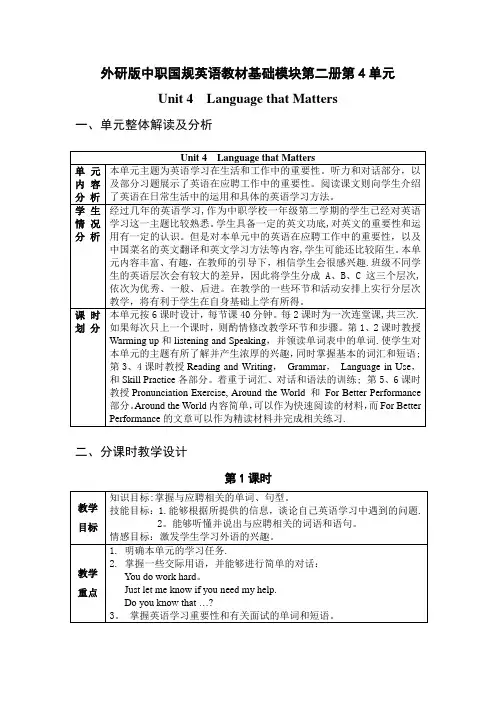
外研版中职国规英语教材基础模块第二册第4单元
Unit 4 Language that Matters
一、单元整体解读及分析
二、分课时教学设计
第1课时
第2课时
第3课时
第4课时
第5课时
第6课时
作者简介:杨娜,1984年出生于陕西汉中,2006年毕业于西北大学。
2006年8月至2007年7月在大连一外企工作,主要从事幼儿及初中英语教学软件推广及配套教材和练习册的编写。
2007年8月至今在大连市经济贸易学校工作,主要从事中专和大专英语的教学工作。
曾教过的课程有基础英语、面试英语、会展英语、旅游英语、民航英语和新概念英语。
参与编写校本教材《会展英语》和《面试英语》。
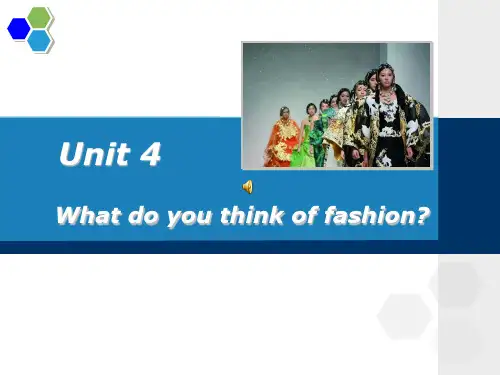

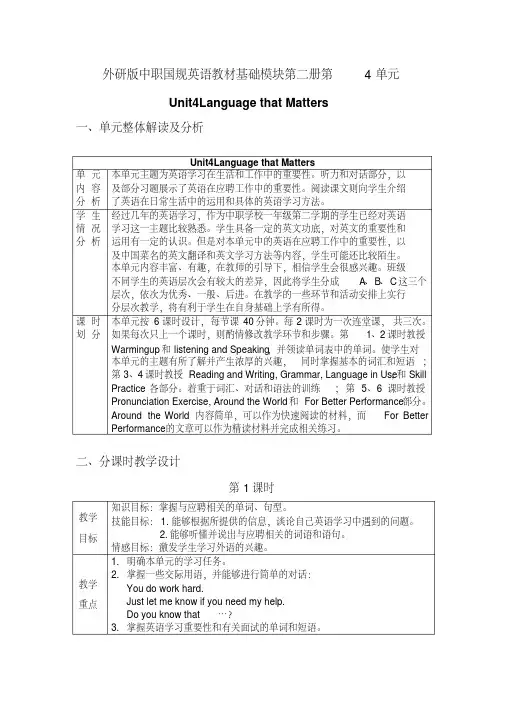

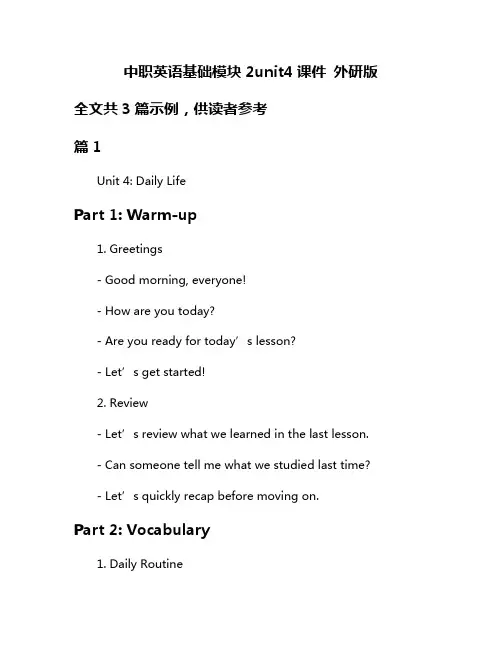
中职英语基础模块2unit4课件外研版全文共3篇示例,供读者参考篇1Unit 4: Daily LifePart 1: Warm-up1. Greetings- Good morning, everyone!- How are you today?- Are you ready for today’s lesson?- Let’s get started!2. Review- Let’s review what we learned in the last lesson.- Can someone tell me what we studied last time?- Let’s quickly recap before moving on.Part 2: Vocabulary1. Daily Routine- Brush teeth- Wash face- Have breakfast- Go to work/school- Have lunch- Do homework/study- Have dinner- Take a shower- Go to bed2. Expressions- What time is it?- What’s the date today?- Have a good day!- Good night!- See you later!Part 3: Listening Practice1. Listening Comprehension- Listen to the audio and answer the questions.- Pay attention to the keywords and try to understand the main ideas.2. Dialogue Practice- Work with a partner to practice the dialogues.- Pay attention to pronunciation and intonation.Part 4: Grammar1. Present Simple Tense- I brush my teeth every morning.- She goes to work by bus.- We have dinner at 7 o’clock.- They study English on weekends.2. Time Expressions- Every day/week/month- In the morning/afternoon/evening- At 6 o’clock/12 noon/midnight- On Monday/Tuesday/FridayPart 5: Speaking Practice1. Interview Activity- Interview a classmate about their daily routine.- Take notes and share with the class.2. Role Play- Act out a typical day in your life.- Use the vocabulary and expressions we’ve learned. Part 6: Writing Task1. Daily Journal- Write a journal entry about your day.- Include details about your routine and any special events.2. Email Writing- Write an email to a friend describing what you did today.- Use the present simple tense and time expressions. Part 7: Review Game1. Daily Life Quiz- Test your knowledge with a fun quiz.- Earn points for correct answers and compete with your classmates.2. Wrap-up- That’s all for today’s lesson. Well done, everyone!- Remember to practice what we’ve learned and review for the next class.- See you next time! Have a great day!篇2Unit 4: Making PlansPart 1: VocabularyIn this unit, we will learn some vocabulary related to making plans. Let's start with some common words and phrases:1. Arrange: to make plans or preparations for somethingExample: We need to arrange a meeting to discuss the project.2. Schedule: a plan that shows the times that events will happen or the things that people have to doExample: What's your schedule for tomorrow?3. Confirm: to say or show that something is true or correctExample: Please confirm your attendance at the meeting.4. Reschedule: to set a new time or date for something that has been plannedExample: We had to reschedule the meeting for next week.5. Postpone: to arrange for something to happen at a later time than originally plannedExample: The concert has been postponed due to bad weather.6. Cancel: to decide that an event will not happenExample: The workshop has been canceled due to low attendance.Part 2: GrammarIn this unit, we will also learn some grammar structures used for making plans. Let's look at a few examples:1. Present Continuous for Future ArrangementsWe use the present continuous tense to talk about future plans that are already fixed or arranged.Example: I'm meeting Sarah for lunch tomorrow.2. Going To for Future PlansWe use "going to" to talk about future plans that we have already decided or intend to do.Example: I'm going to study abroad next year.3. Will for Future DecisionsWe use "will" to make decisions at the moment of speaking.Example: I'll call you when I arrive.Part 3: Speaking PracticeNow, let's practice making plans using the vocabulary and grammar structures we have learned in this unit. Here are some conversation prompts to help you get started:1. What are your plans for this weekend?2. Have you arranged your schedule for next week?3. Are you going to attend the party on Saturday?4. Do you need to reschedule our meeting?5. Will you confirm your attendance at the event?Remember to use the vocabulary and grammar structures we have learned to communicate effectively when making plans. Good luck!篇3Unit 4 of the Basic Module 2 of Vocational English in the New Foreign Version covers a variety of topics related to work and employment. In this unit, students will learn how to describe job responsibilities, discuss career goals, and understand workplace etiquette.The unit begins with a discussion on different types of jobs and industries, helping students expand their vocabulary related to work. They will learn common job titles and descriptions, as well as the skills and qualifications needed for various professions.Next, students will explore the concept of job responsibilities and how to effectively communicate these to others. They will practice using modal verbs to express obligations and duties in the workplace, as well as discuss the importance of teamwork and collaboration in achieving common goals.Following this, the unit delves into the topic of career goals and aspirations. Students will learn how to talk about theirlong-term career objectives and the steps they need to take to achieve them. They will also discuss the importance of continuous learning and professional development in pursuing a successful career.Additionally, the unit covers workplace etiquette and professional communication. Students will learn how to communicate effectively with colleagues and supervisors, as well as handle conflicts and feedback in a constructive manner. They will also explore the dos and don'ts of office conduct, including appropriate dress code and email etiquette.Overall, Unit 4 of the Basic Module 2 of Vocational English in the New Foreign Version provides students with the necessary language skills and cultural awareness to succeed in the modern workplace. By mastering the concepts and practicing the language exercises in this unit, students will be better equipped to navigate the complexities of the professional world and achieve their career goals.。
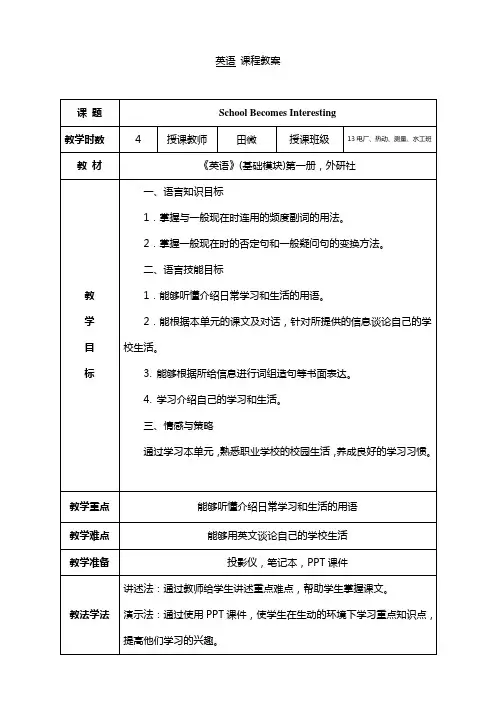
英语课程教案课题School Becomes Interesting教学时数 4 授课教师田微授课班级13电厂、热动、测量、水工班教材《英语》(基础模块)第一册,外研社教学目标一、语言知识目标1.掌握与一般现在时连用的频度副词的用法。
2.掌握一般现在时的否定句和一般疑问句的变换方法。
二、语言技能目标1.能够听懂介绍日常学习和生活的用语。
2.能根据本单元的课文及对话,针对所提供的信息谈论自己的学校生活。
3. 能够根据所给信息进行词组造句等书面表达。
4. 学习介绍自己的学习和生活。
三、情感与策略通过学习本单元,熟悉职业学校的校园生活,养成良好的学习习惯。
教学重点能够听懂介绍日常学习和生活的用语教学难点能够用英文谈论自己的学校生活教学准备投影仪,笔记本,PPT课件教法学法讲述法:通过教师给学生讲述重点难点,帮助学生掌握课文。
演示法:通过使用PPT课件,使学生在生动的环境下学习重点知识点,提高他们学习的兴趣。
总体思路本单元以介绍中职学生的日常学习、生活为主,通过学习这部分内容,让学生更加了解中职学校的特点。
重点教学环节设计个性化教学一、复习:通过上一单元的学习,我们学习了如何谈天气。
在这里复习下重点知识。
①write the words in English.多云的暴风雨刮风的晴朗的在北方②reading:.Read the text of reading and writing二、新课导入童鞋们来到职业学校学习,学习和生活上都会与以前不同,那么这里的生活是什么样子的呢?Warming up首先用PPT给出书上的图片及单词,然后让学生进行连线。
Then let’s study the words. 教学光盘及下载的网络知识可以活跃课堂气氛,亦可以增加学习效果。
First, answer the questions: Then study the words ③Do exerciseListening and SpeakingTo learn the new words.then listen to the dialogue and repeat.首先,让学生先自己听录音,然后将难点在书上标记,这样便于听讲,之后,根据录音跟读对话。
